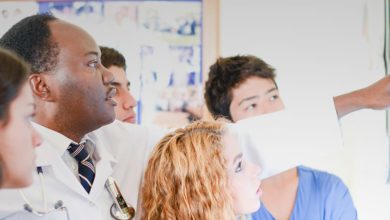In medical school you’ll hear certain phrases over and over. Some of them are pearls of important clinical knowledge being funneled down from physicians, and others are sayings that may be common among your peers, but either way, they help demonstrate some of the themes, sayings, and stereotypes that you may encounter throughout the first few years of medical school.
In medical school you’ll hear certain phrases over and over. Some of them are pearls of important clinical knowledge being funneled down from physicians, and others are sayings that may be common among your peers, but either way, they help demonstrate some of the themes, sayings, and stereotypes that you may encounter throughout the first few years of medical school.
1.) “Listen to your patients”
This is a big one. I’m sure many of you have had an experience where you visit the doctor and it seems like they are disinterested, rushed, and generic in their approach to your care. From a patient perspective, they are unpleasant to visit, and their disposition can occasionally affect your treatment. As I’ve been told from several doctors, this can stem from a physician’s own trust in their patient being abused throughout their career. The trick is to make sure that over time those negative experiences don’t create a less compassionate and attentive physician. We recently had a visit from a chronic pain patient who was describing her experiences of being treated and diagnosed for sickle cell anemia. The condition sometimes results in flares of excruciating pain called a “sickle cell crisis.” She came into the Emergency Department in a sickle cell crisis and was left in pain for hours before receiving appropriate medication. Part of this may be due to the fact that malingering (exaggerating or faking symptoms to receive opiates or pain medications) is unfortunately common in the Emergency Department, meaning that many patients may be approached with a certain level of initial suspicion. Either way, this patient was not listened to, and it affected her care and unnecessarily left her in pain. As hard as it may be to remember and practice throughout an entire career, it is an important tenant that you will hear over and over- listen to your patients.
2.) “Never drive a motor cycle”
You’ll hear this from physicians and professors alike, but why? Well it’s because many of them have personally witnessed far too many young and healthy individuals end up the victim of a debilitating motorcycle crash. In medicine you have to adjust to so many difficult realities that when you come across one that seems preventable, you preach it. This is one that gets preached. Many epidemiological studies have been done on motorcycle safety statistics, and two large papers (Hurt and MAIDS) have also described the increased risk in driving a motorcycle. It has been roughly calculated that there is a 6 times greater risk of a fatal crash on a motorcycle as opposed to being in a motor vehicle collision, and also a higher crash frequency per miles traveled. When focusing on younger populations, these statistics expand to a relatively higher risk for that age group compared to other mechanisms of injury. As with anyone who loves a sport or hobby that has risks to it, the risk can often be considered worth it to those who love to ride, but I’ve still never heard of a physician suggest that I should drive a motorcycle, and I don’t imagine I ever will.
3.) “First years only know about Diabetes”
This is something you’ll hear jokingly tossed around by medical students or referenced in medical school music videos, so do first years only really know about diabetes? Of course not, and for many schools you might not even get to the detailed pathophysiology of diabetes it until months into your first year. Another saying you’ll hear is that you will never know more medical information than you will know at the end of your second year in medical school (before the Step 1 exam). For your first two years you deal mostly in learning massive amounts of medical information, while your clinical skills develop at a slower rate. Physicians are professional at providing healthcare, but when you’re in medical school, you’re a professional student, so it is not uncommon for medical students to know more information than an attending does in regards to certain medical details. This is not as bold of an assertion as some may think. Medical students need to learn a vast amount of knowledge to develop a more holistic understanding of the field, while doctors and specialists have long forgotten irrelevant information in exchange for more important and practical wisdom and skill in their clinical practice. In summary, medical students know more than diabetes, much more, but with limited exposure to the field and little experience with clinical application, their large foundation of information has a very long maturation process ahead of it.
4.) “Gunners never prosper”
Also not completely true. Gunners may prosper, and many do, but usually at a cost. According to the urban dictionary, a Gunner is a “person who is competitive, overly-ambitious and substantially exceeds minimum requirements. A gunner will compromise his/her relationships and/or reputation among peers in order to obtain recognition and praise from his/her superiors.” You will always hear about gunners in medical school, so it becomes a personal decision on what you want out of your medical school experience, and how competitive you’d like to be. If you do choose to be a gunner, keep in mind you may have to put up with people photoshopping your face on Sylvester Stallone’s body on a poster of The Expendables .
The views and opinions expressed in this article are those of the author and do not necessarily reflect the views of ProspectiveDoctor



